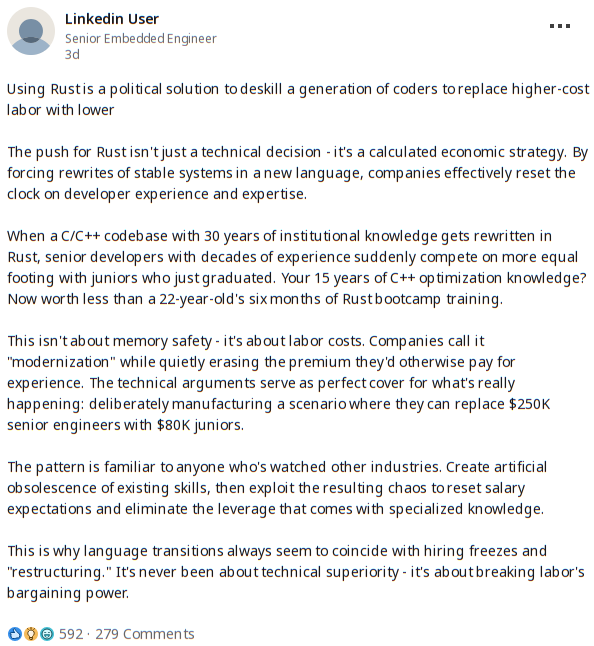this post was submitted on 25 Mar 2025
204 points (97.2% liked)
Rust
6889 readers
22 users here now
Welcome to the Rust community! This is a place to discuss about the Rust programming language.
Wormhole
Credits
- The icon is a modified version of the official rust logo (changing the colors to a gradient and black background)
founded 2 years ago
MODERATORS
you are viewing a single comment's thread
view the rest of the comments
view the rest of the comments

I'm still learning Rust coming from Python and R and honestly point 2 and 3 are not even that bad. Sure I have been bashing my head against some corners, and the lack of OOP was somewhat unexpected, but imho the language really helps you think about what you are doing.
Rust absolutely has OOP, that's what Traits are for. It just doesn't have classical inheritance, so you structure your patterns a bit differently.
That said, I lean more into functional-inspired style anyway, which tends to work pretty well w/ Rust.
traits aren't oop. they're closer to haskell's typeclasses than anything else
At its core, OOP is just commingling data and operations, whereas FP is separating data from operations on data. I'm not an expert at Haskell (I cut my FP teeth on Lisp), but that's essentially what typeclasses look like to me.
The Rust book has a section on OOP, and the main thing to remember is that Rust solves OOP through composition instead of inheritance. Rust doesn't have inheritance in any meaningful way, but it can solve problems in a similar way as classical OOP.
i would strongly disagree with that characterization of both fp and oo. classifying rust as oo weakens it imo, and the fact that you can easily solve all the problems oo solves in rust, as your linked document shows, is not proof rust is oo, but rather that oo is unnecessary to solve those problems
object orientation is classes done wrong. typeclasses (and traits) are classes done right
Then how would you define OOP and FP?
Wikipedia claims it supports OOP:
I wouldn't say Rust is an OOP language though, because that absolutely gives the wrong impression since that evokes ideas of classical inheritance as in C++ or Java. But I do very much believe it supports object oriented programming as a paradigm, since you can model things with objects at the core.
That said, I think Rust is best used with less emphasis on OOP, since it's pretty easy to get into trouble modeling things that way when it comes to lifetimes. I use OOP-style in Rust when it makes sense, and the rest is as close to functional as I can get it.
I think classical inheritance is object oriented programming done wrong. Go had the start of a good idea with composition and interfaces, and I think Rust's traits + generics improved on it.